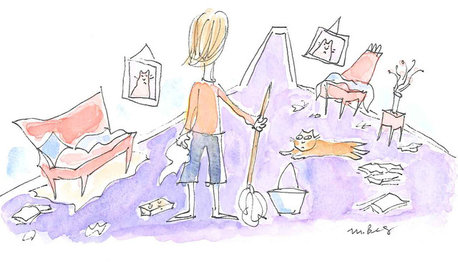what can we do if 'the dust bowl ' revisiting?
tuanh
17 years ago
Related Stories

KITCHEN DESIGNTraditional Revisited: Plate Racks
This Traditional Way to Keep Plates Handy Works in Contemporary Homes Too
Full Story
KITCHEN DESIGNThe Cure for Houzz Envy: Kitchen Touches Anyone Can Do
Take your kitchen up a notch even if it will never reach top-of-the-line, with these cheap and easy decorating ideas
Full Story
KITCHEN DESIGN6 Clever Kitchen Storage Ideas Anyone Can Use
No pantry, small kitchen, cabinet shortage ... whatever your storage or organizing dilemma, one of these ideas can help
Full Story
HOUSEKEEPING10 Chores You Can Whip Through During Commercials
Use ad time for getting tasks done, and it’s like fast-forwarding your house into cleanliness
Full Story
MOST POPULARYou Can Turn That Into a Bathroom Vanity?
Find inspiration in 13 unconventional bathroom vanities that are as functional as the real deal
Full Story
DECORATING GUIDES15 Bite-Size Home Projects You Can Tackle in No Time
See how getting little decorating, cleaning and organizing tasks done can add up to a big sense of accomplishment
Full Story
BATHROOM DESIGNThe Cure for Houzz Envy: Bathroom Touches Anyone Can Do
Take your bath from blah to ‘ahhhh’ with just a few easy and inexpensive moves
Full Story
LIFEWe Can Work It Out: Living (and Cleaning) Together
Run a household without fussing and fighting with these ideas for how to work together on household chores
Full Story
DECORATING GUIDESWhat We Can Learn From the Minimalists
Discover the power of simplicity and how to employ a less-is-more approach in your decorating scheme
Full Story
ENTRYWAYSSingle Design Moves That Can Transform an Entry
Take your foyer from merely fine to fabulous with one brilliant touch
Full StoryMore Discussions






ksfarmer
maifleur01
Related Professionals
Elwood Landscape Architects & Landscape Designers · Marina Landscape Architects & Landscape Designers · Roxbury Crossing Landscape Architects & Landscape Designers · Anderson Landscape Contractors · Deerfield Landscape Contractors · Eagle Landscape Contractors · Hawthorne Landscape Contractors · Kaneohe Landscape Contractors · Mercedes Landscape Contractors · Rockwall Landscape Contractors · San Bruno Landscape Contractors · Shafter Landscape Contractors · Beaumont Siding & Exteriors · Menomonee Falls Siding & Exteriors · Mount Holly General Contractorsrembetika
xericgardening
rembetika
xericgardening
uncaray
desertvalleywitch